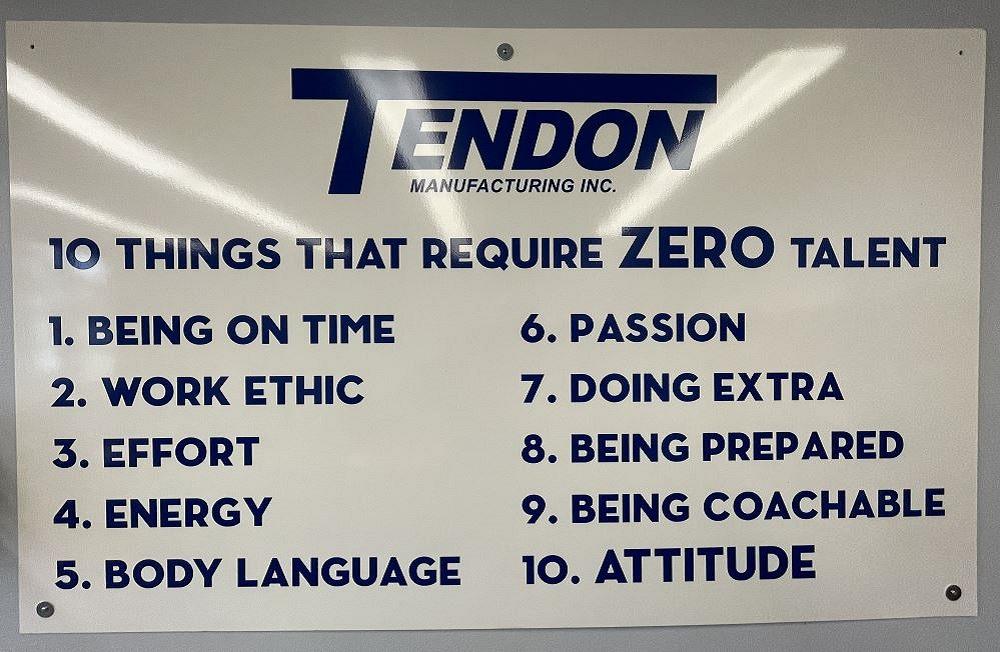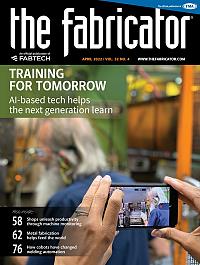Senior Editor
- FMA
- The Fabricator
- FABTECH
- Canadian Metalworking
Categories
- Additive Manufacturing
- Aluminum Welding
- Arc Welding
- Assembly and Joining
- Automation and Robotics
- Bending and Forming
- Consumables
- Cutting and Weld Prep
- Electric Vehicles
- En Español
- Finishing
- Hydroforming
- Laser Cutting
- Laser Welding
- Machining
- Manufacturing Software
- Materials Handling
- Metals/Materials
- Oxyfuel Cutting
- Plasma Cutting
- Power Tools
- Punching and Other Holemaking
- Roll Forming
- Safety
- Sawing
- Shearing
- Shop Management
- Testing and Measuring
- Tube and Pipe Fabrication
- Tube and Pipe Production
- Waterjet Cutting
Industry Directory
Webcasts
Podcasts
FAB 40
Advertise
Subscribe
Account Login
Search
How one job shop used social media to hire more skilled workers
Strategies of casting a wider hiring net in manufacturing with Facebook and other social media
- By Tim Heston
- April 15, 2022
- Article
- Shop Management

How metal fabricators and other manufacturing companies can use Facebook and other social media platforms to hire more skilled workers. Getty Images
Michael Gordon Jr., sales manager at Tendon Mfg., a Cleveland custom sheet metal fabricator, recalled going to tradeshows, job fairs, high schools, and a plethora of hiring events around the metro area.
“We were trying to attack [our hiring challenges] from every avenue possible. We hosted hiring events. We’d go to job fairs, pay for a spot to be there, and we were paying a guy like me or our plant manager to just sit there [at the job fair booth] all day. The juice just wasn’t worth the squeeze.”
That struggle sparked Tendon managers to try something new. They went to Facebook. They first built up a base of followers on the company page, aiming for viewer engagement. “We didn’t want to show just a bunch of welding and forming,” Gordon said. “We didn’t want people to think we were some boring manufacturing company. So, we started focusing on the cool technologies, like fiber laser, and on cool projects, like the signage we do for the NFL, NBA, and MLB. That started generating buzz.”
Next, the shop started publishing its job postings—but not conventional ones. Like many fab shops, Tendon has found it nearly impossible to hire people with experience. Ads saying “We’re looking for experienced press brake operators and welders” generated little if any traction. Tendon was casting a tiny net in a wide ocean; no wonder the net came back mostly empty.
Tendon needed to cast a wider net, but how? Luckily, the shop already had a good training structure in place. Gordon added that, of course, the company prefers hiring people with experience, but managers also know that the experienced job-hunting population is extraordinarily small. So, Tendon has built an in-house training structure around the new normal: Most new hires will have no metal fabrication experience whatsoever. Along with conventional shadowing and coaching, new hires go to class. A recently retired shop floor supervisor—affectionately known as “the professor”—teaches after-lunch seminars twice a week to between five and 10 new hires. The professor covers everything from blueprint reading to the basics of press brake operation.
Managers also observe new hires on what the fabricator calls “10 things that require zero talent”—a list, posted on walls throughout the shop—that starts with punctuality (it’s tough to do a good job if you don’t show up) and ends with attitude. Someone needn’t know intricate bend calculations to start putting in effort and energy from day one.
This sets the cultural foundation to lift novices up, to take someone right out of high school, train them, and within a few years compensate them well enough so they can become a homeowner and pursue the middle-class dream—with no burdensome college debt. That’s the benefit of working at Tendon and, for that matter, the multitude of progressive metal fabricators out there desperate for more help.
Tendon managers knew they had a progressive culture and good in-house training. All they needed was a way to catch people’s attention. This, Gordon said, is where those Facebook job postings came into play.
Tendon strips away pretense and puts humor front and center. In 2020 Cleveland.com ranked the shop the best small company to work for, and it didn’t get there by being insincere. Tendon’s job postings needed to reflect that.
“When we post ads, we try to be fun and entertaining about it,” Gordon said. “We do posts with Tommy Callahan from ‘Tommy Boy’ or show scenes from ‘The Office’ TV series, just to get reactions from people. The funnier we are, the more interest we get.”

The skilled workforce at Cleveland-based Tendon Mfg.’s job shop has skyrocketed in recent months. Most new hires didn’t discover the custom sheet metal fabricator through job fairs or other events. They discovered the shop through social media platforms like Facebook.
The ad’s verbiage isn’t particularly funny, at least out of context with the graphics. Regardless, ads that reach a broad audience tend to spur better results. Gordon recalled last year that the shop needed help in labeling, packaging, and shipping. He placed an ad for general labor, complete with a scene from “The Office” showing the cast playing basketball in Dunder Mifflin’s warehouse. That ad alone attracted more than 200 applicants.
These weren’t for temporary positions, either. In fact, the shop’s job openings for general labor might be its secret sauce for attracting people and developing their skill. Those who don’t want a career-focused life can remain general laborers and helpers. That said, managers observe rookies in the shop, continually gauge their interests, and, most important, help them build careers around those interests.
Gordon recalled two high school graduates who responded to a Facebook ad last year. They showed up to the interview in button-down shirts—a good sign. “They seemed like nice kids, but both had absolutely no experience,” Gordon recalled, adding that the two had never held a job before. Tendon hired both on the spot. Since then, the two have exceled at electrical assembly and have been introduced to the basics of gas metal arc and even gas tungsten arc welding. In less than a year their pay has increased by almost 30%—not just because they’re learning new skills, but also because they cover all 10 of those “things that require no talent.”
In 2021 alone Tendon hired more than 25 people thanks to those Facebook job posts, increasing the shop’s head count to 106. Some are “boosted” more than others (that is, they get favorable treatment in searches and so cost a bit more), but regardless, the most effective ads have elements of humor, humility, and authenticity. When new hires discover those same elements when they start working at Tendon, they’re more likely to stay.
About the Author

Tim Heston
2135 Point Blvd
Elgin, IL 60123
815-381-1314
Tim Heston, The Fabricator's senior editor, has covered the metal fabrication industry since 1998, starting his career at the American Welding Society's Welding Journal. Since then he has covered the full range of metal fabrication processes, from stamping, bending, and cutting to grinding and polishing. He joined The Fabricator's staff in October 2007.
subscribe now

The Fabricator is North America's leading magazine for the metal forming and fabricating industry. The magazine delivers the news, technical articles, and case histories that enable fabricators to do their jobs more efficiently. The Fabricator has served the industry since 1970.
start your free subscription- Stay connected from anywhere

Easily access valuable industry resources now with full access to the digital edition of The Fabricator.

Easily access valuable industry resources now with full access to the digital edition of The Welder.

Easily access valuable industry resources now with full access to the digital edition of The Tube and Pipe Journal.
- Podcasting
- Podcast:
- The Fabricator Podcast
- Published:
- 04/16/2024
- Running Time:
- 63:29
In this episode of The Fabricator Podcast, Caleb Chamberlain, co-founder and CEO of OSH Cut, discusses his company’s...
- Trending Articles
Steel industry reacts to Nucor’s new weekly published HRC price

How to set a press brake backgauge manually

Capturing, recording equipment inspection data for FMEA

Are two heads better than one in fiber laser cutting?

Hypertherm Associates implements Rapyuta Robotics AMRs in warehouse

- Industry Events
16th Annual Safety Conference
- April 30 - May 1, 2024
- Elgin,
Pipe and Tube Conference
- May 21 - 22, 2024
- Omaha, NE
World-Class Roll Forming Workshop
- June 5 - 6, 2024
- Louisville, KY
Advanced Laser Application Workshop
- June 25 - 27, 2024
- Novi, MI


























